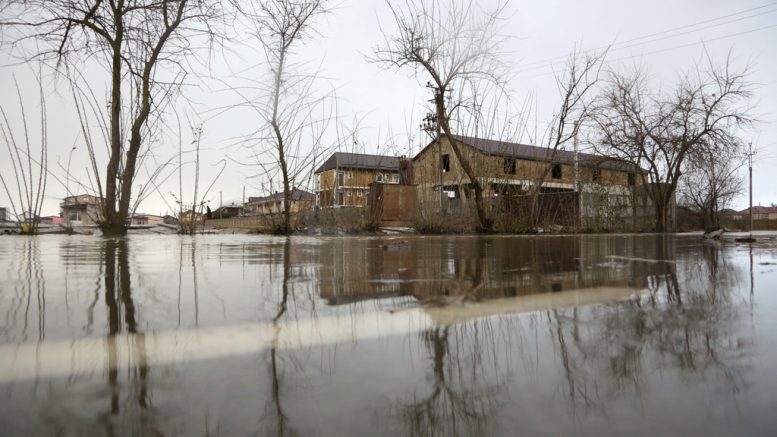More than half a million people left without power in Crimea, Russia and Ukraine after huge storm
By The Associated Press undefined
A storm in the Black Sea damaged buildings and knocked down power lines, leaving more than half a million people without power in Crimea, Russia and Ukraine, Russian state media and Ukraine’s energy ministry said. One person was killed. The storm sent waves flooding into the Russian Black Sea beach resort of Sochi, caused a cargo ship to run aground and damaged buildings elsewhere, the Tass news agency said. Ukraine’s Ministry of Energy said more than 2,000 towns and villages were without electricity, while Moscow experienced its heaviest snowfall in 40 years. Ukraine’s energy ministry predicted more strong winds and snowfall.
More than half a million people were left without power in Crimea, Russia and Ukraine after a storm in the Black Sea area flooded roads, ripped up trees and took down power lines, Russian state news agency Tass and Ukraine’s energy ministry said. Meanwhile, the Moscow region experienced its heaviest snowfall in 40 years, the governor said.
The storms and snowfall were part of a weather front that left one person dead and many places without electricity amid heavy snow and blizzards in Romania and Moldova on Sunday.
The head of Russia’s national meteorological service said the storm that hit Crimea was the most powerful since record-keeping began, state news agency RIA Novosti reported.
Crimea was annexed from Ukraine by Russia in 2014 and is a key military and logistics hub for Russia as it pursues its war in Ukraine. It is unclear whether the storm damaged any Russian military equipment or defenses.
The storm also hit southern Russia and sent waves flooding into the beach resort of Sochi, blew the roof off a five-story building in Anapa and damaged homes and schools in Kuban, the state news agency said. It also caused a cargo ship to run aground near Anapa.
Local Russia-installed officials said one person died in Crimea after going out to look at the waves in a village near the town of Sudak in the southern part of the peninsula, while other people were hospitalized or evacuated from their homes.
The government in Crimea told people to stay at home on Monday and closed government facilities, including schools and hospitals, as strong winds were expected to continue.
The storm prompted several Crimean regions to declare a state of emergency, Tatyana Lyubetskaya, a Russia-installed official at the Crimean environmental monitoring department, told Tass.
Roman Vilfand, the head of Russia’s national meteorological service, told RIA Novosti that a similar storm hit the region in November 1854 during the Crimean War. It caused at least 30 ships to sink off Crimea’s coast, RIA Novosti said.
The head of one Crimean region, Natalia Pisareva, said everyone in the Chernomorske area of western Crimea lost water supply as well as central heating because pumping stations had lost power. There were also reports of a problem with a gas pipeline in Saky in western Crimea.
Around 800 exotic fish died in an aquarium in Sevastopol after the room they were in was flooded, the Crimea 24 TV channel reported. The fish, including pikes and piranhas, died from thermal shock after cold sea water flooded the aquarium, the aquarium director told RIA Novosti.
Ukraine’s Ministry of Energy said more than 2,000 towns and villages were without electricity in 16 Ukrainian regions, including Kyiv, Odesa and Mykolaiv. It said it expected the weather to worsen, with forecasters predicting more strong winds and snowfall.
In southern Russia, the Caspian Pipeline Consortium stopped crude oil loading at the Novorossiysk port on Monday due to “extremely unfavorable weather conditions,” including winds of up to about 86 kilometers (54 miles) per hour and waves of up to 8 meters (26 feet).
Heavy snow in the Moscow region caused drifts of up to 25 centimeters (almost 10 inches), three times more than normal, Tass said. Andrei Vorobyov, the governor of the Moscow region, said about 3,000 people worked to clear the streets after the heaviest snowfall in 40 years.
In Serbia, heavy snow that fell over the weekend left villages cut off and thousands of people without electricity.
A 53-year-old man was reported missing on Sunday in central Serbia and the search for him is continuing, RTS state television reported.
In Bulgaria, the storm downed power lines and caused snowfall of up to 40 centimeters (almost 16 inches), forcing schools to close and sparking the rescue of more than 1,000 people trapped in vehicles.








































